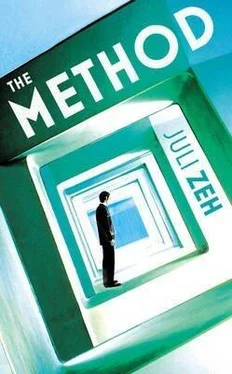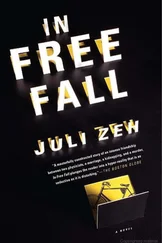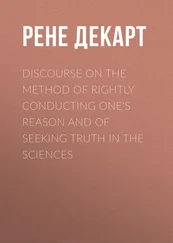The chief witness doesn’t hesitate. ‘Her name is Mia Holl.’ He scans the courtroom nervously, not looking at the defendant.
‘Good gracious,’ says Mia, staring pityingly at the handcuffed man. ‘What on earth did they do to you?’
Hutschneider activates his digital recorder. ‘Point one. Let it be noted that the defendant, on seeing the chief witness, greeted him in the manner of a friend,’ he says.
‘Is Kramer making you do this?’ asks Mia.
‘She’s Moritz Holl’s sister,’ says No one in the flat tone of a person reading from a script.
‘You’re Wörmer, aren’t you? The TV presenter. “Legitimate governments are like custom-made shoes — they never pinch or rub.” That was you, wasn’t it? I thought it was good.’
‘Point two. Let it be noted that the defendant has identified the witness by name. She shares his views.’
‘Mia Holl replaced her brother Moritz as the leader of the Snails,’ continues Wörmer.
‘You don’t have to say that,’ says Mia sadly.
‘I was her contact person. I used to meet her in the cathedral.’
‘Point three. The chief witness has identified the defendant as the leader of an anti-Method faction.’
No one turns to face the judge. ‘That’s all,’ he says.
‘Wörmer,’ says Mia, ‘when you wrote your article, you must have been thinking about me, an innocent citizen at the mercy of the Method.’
‘Can I go?’ asks No one . ‘Right now.’
‘And while you were writing the article, you must have imagined what it would be like to talk to me, to tell me your thoughts, to express the things you’d never said. You must have imagined how good it would be to talk to someone and look them in the eye.’
‘Point four. The defendant addressed the chief witness and made reference to their shared beliefs.’
No one glances around frantically and tries to beckon the guards with his manacled hands. ‘I’ve made my statement,’ he says.
‘I’m right here, Wörmer. You can see my eyes. You can hear my voice. Lean against the Plexiglas and you’ll smell me as well.’
‘Point five. The chief witness concluded his statement and left the stand,’ says Hutschneider to his digital recorder.
‘Look at me,’ says Mia, raising her voice. ‘I stand for what we all think! I’m the corpus delicti . Look me in the eye and repeat your lies.’
‘Take him away,’ says Hutschneider.
No one casts a quick look at Mia; the guards tug him away and march him out of the room. The judge hurries to gather up his books.
‘Since life,’ says Mia, ‘is meaningless and yet you have to keep going, I sometimes feel like making sculptures out of copper pipes. I could weld them together and make a crane, or pile them up randomly like a nest of fossilised worms . A good joke, wouldn’t you say, Judge Hutschneider? Why aren’t you laughing?’
Mia laughs. She is still laughing as Hutschneider closes his briefcase. She is laughing, thinks Hutschneider, at him . He leaves the courtroom in haste.
HE IS A terrible actor. He knows that she knows that he knows — and so on and so forth until the end of time. Rosentreter is on his way to the visitors’ room and already he feels exposed. Ever since Moritz was proven innocent, there has been a strange look in Mia’s eyes. It seems to pass through everything, as if the world were made of glass. It is a look that hurts, a look that is best avoided, especially by people bearing bad news. And Rosentreter’s head, hands, shirt pockets and trouser pockets are spilling over with bad news. In fact, he is ready to believe that he himself is a piece of bad news. The upbeat expression he assumes as he walks through the door puts a strain on his cheeks. He isn’t surprised to see that Mia is there already. He can’t recall a single occasion when he has arrived in time to see her walk through the door: she is always there before him, standing or sitting as the situation demands. It is almost as if she has been left there, in exactly the right location to deliver her lines. Rosentreter imagines a zip running down her back and cables in her belly. Over the past few days he has caught himself starting to hate her. He is ashamed of himself for hating her and ashamed that it makes him feel better. It simplifies the situation. It is a relief to hate Mia, to hate her without the slightest justification and with all his heart.
She looks in his direction and waits motionless as he takes up position on the other side of the Plexiglas. Her face is drawn and Rosentreter wonders if they are giving her enough to eat. If he is honest with himself, he doesn’t really want to know. Given the choice, he would like the matter to be over. Since his historic victory in the courtroom, things have taken a wrong turn. Mia is to blame. She was the one who refused to follow his advice; she was the one who insisted on her radical stance. She opened the door to the predatory Kramer — and why? In Rosentreter’s eyes, there can only be one explanation: Mia is obsessive, masochistic and, very likely, psychologically disturbed. Things had started so well: he had taken the initiative and triumphed in court. Then Mia hijacked the situation and insisted on pursuing her own crazy goals. Rosentreter can’t do much to help her at this stage. Legally, this is known as superseding causation. It is a simple question of accountability. Mia wanted to be the cause of something, thus Mia alone is responsible for the consequences. There isn’t the slightest reason for her lawyer to feel bad on her behalf.
Mia’s face brightens as soon as Rosentreter takes a seat. ‘Hello,’ she says simply.
She is clearly pleased to see him, which makes Rosentreter hate her more. He privately attributes his emotional state to confusion. He feels thoroughly out of his depth. He doesn’t know how to start the conversation, much less where to take it from there. Mia comes to his aid.
‘It’s quite simple,’ she says, while Rosentreter wonders, not without anxiety, whether she can read his thoughts. ‘You draw air into your lungs, you raise your soft palate, air passes over your vocal cords, and you move your lips and tongue. Or, to put it another way, you speak.’
She smiles. She was probably trying to be funny. At this point she places her hand on the partition in a comforting gesture, whereupon Rosentreter is stricken with such despair that he finally finds the impetus to pull himself together.
‘The High Court has dismissed your, I mean, our appeal.’ He clears his throat. ‘The judge cited insufficient prospect of success.’
‘So I’m stuck here?’
‘Apparently so. The application for exemption was rejected as well. You’ll have to go back to court.’
‘We were expecting as much, were we not?’
‘Yes.’
‘Did you bring the papers? Tell me what they’re saying.’
‘Are you sure you want to know?’
‘I insist.’
Rosentreter produces a small stack of daily papers. It includes only the least condemnatory articles.
‘ New Information in the Case of Mia Holl ,’ he reads out. ‘ Detectives Uncover Botulinum Stash .’
‘Botulinum?’ asks Mia.
‘Should I carry on reading?’
‘Of course! What’s the matter with you?’
‘Maybe I should tell you myself.’ Rosentreter puts down the papers and gets out a tissue to wipe his palms. ‘Bacterial cultures were found in your apartment. In protein tubes, to be precise.’
‘In my apartment?’ Mia thinks for a second; her face clouds over. ‘Of course … That’s why Kramer needed those things!’
‘Your fingerprints were found on the tubes. Inside were fifty grams of botulinum.’
Читать дальше












